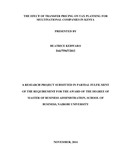| dc.description.abstract | Taxation issues in Kenya have been a hot topic both in the government and in the private
entities. Multinational organizations are operating in an environment of unprecedented
complexity. The rising volume and variety of intercompany transactions and transfer
pricing regulations, accompanied by increased enforcement activities worldwide have
made transfer pricing a leading risk management issue for global businesses.
The government on one hand, is tirelessly working hard to uncover all the revenue
leakage avenues devised by various businesses to shield themselves from paying taxes
while the private sector on the other hand are aggressively engaging the knowledge of the
experts in the effort to discover and embrace strategies to protect their revenues from
heavy taxation. It emerges that whereas the Kenyan taxpayer diligently bears the heavy
tax burden, foreign multinationals appear to get away with payment of taxes with ease.
On that note, the Kenya Revenue authority is day in day out working so hard to come up
with ways of raising revenues to meet the expenditure demands of the state and to hit the
Budget targets.
Transfer pricing is a 20th century phenomenon which came as result of the 2005 Unilever
case which evidenced a lack of the transfer pricing Rules. A transfer price is a price
charged by a Company supplying goods/ Services to another related party or company.
The related party can be a subsidiary, an associate or a joint venture.
The objective of this study was to establish the effect of transfer pricing on tax planning
for Multinational companies in Kenya. The study adopted a descriptive study. The study
used primary data gathered from a sample of Multinational companies based in Nairobi
and its environs. The data was analyzed using SPSS providing various parameters to
show the strength of the relationship between the variables under observation.
In summary, the results show indirect evidence that transfer pricing is one of the
determinants of tax planning activity among others in MNCs. The study shows a positive
relationship between the dependent (tax saved) and independent variables (transfer price
adopted & the number of subsidiaries a multinational has). The outcome of this statistics
is consistent with earlier studies of Kar and Cartwright-Smith (2008) that have linked
transfer pricing practices with tax avoidance.
The recommendations of this study are that Transfer pricing presents many tax, legal and
operational challenges. To many taxpayers the magnitude of uncertainties – including the
potential commitment of management time to successfully defend a transfer pricing
examination – is not an acceptable business risk therefore, The Kenya Revenue Authority
should focus more on various tax planning mechanisms adopted by Multinational
companies to avoid the revenue leakages of the state. In general conclusion transfer
pricing has an effect on tax planning of companies. | en_US |

